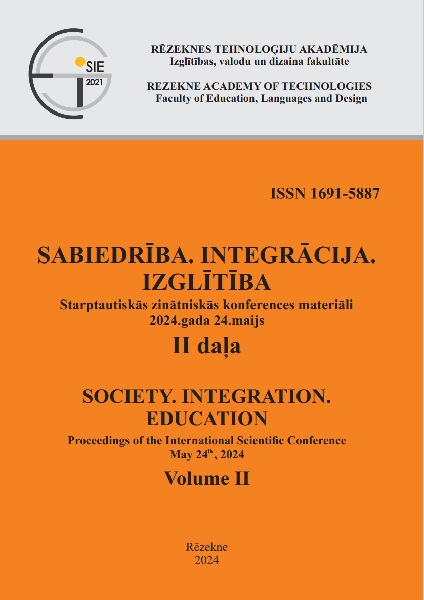ENHANCING PROFESSIONAL COMPETENCY VALIDATION FOR EDUCATIONAL WORKERS (leveraging international experience for Ukraine)
DOI:
https://doi.org/10.17770/sie2024vol2.7824Keywords:
cross-cultural learning, educational workers, international experience, professional competency, validationAbstract
The exchange of knowledge and experiences between nations has become imperative for sustainable development and progress today. Ukraine nowadays seeks to enhance the validation process for professional competencies of educational workers. Drawing upon the practical experiences of countries like China, various European nations, the United States, can offer invaluable insights and strategies to optimise Ukraine's educational system. The article aims to present the experience of different countries that by adopting it for education workers` professional competency validation equips Ukraine with a comprehensive toolkit to address the challenges. In particular, the validation of PR China`s (known for its emphasis on rigorous educational standards and competency validation processes), EU`s (diverse educational systems of UR countries offer a rich tapestry of approaches to competency validation), US (accreditation processes and performance-based assessments), Baltic Countries (progressive education policies and commitment to quality assurance) experience, can not only enhances the quality and innovation within Ukraine's educational system but also positions Ukrainian professionals on the global stage. The article as well pays attention not only to benefits that this or that abroad professional validation systems adoption can give Ukraine nowadays, but also makes prognoses as to its practical possibility and possible difficulties.
References
Amani, S., Dolatabadi, Z., Bardsiri, T., Nouri, M., Saraji, J., Poursadeqiyan, M., Khedri, B., Mohammadzadehaghdam, A., Zamani, Z., & Karimzadeh, M. (2022). Designing and validation of self-assessment tool of professional competency and its psychometrics in the administrators of preschool educational centers. Journal for Iran Public Health, 51(11), 2582-2591. DOI: 10.18502/ijph.v51i11.11176. PMID: 36561251; PMCID: PMC9745405.
Diaz, A. (2023). Navigating U.S. Certification Evaluation: Insights for Foreign Professionals. Linked-in. Retrieved from: https://www.linkedin.com/pulse/navigating-us-certification-5-steps-guide-foreign-ariadna-martín-díaz-opeqf
EU competency framework for the management and implementation of the ERDF and Cohesion Fund: user guidelines for the EU competency framework and self-assessment Tool (2017). EU Publication Office. Retrieved from: https://ec.europa.eu/regional_policy/sources/policy/how/improving-investment/competency/eu_competency_framework_guidelines_en.pdf
Fan, W., Gao, Y., Zhao, N., Tong, Y. (2021). Research on the status quo and countermeasures of domestic activities of foreign professional eligibility certificates. Chinese Personnel Science, 48 (10), 51-61. Retrieved from: http://zgrskx.rky.org.cn/CN/abstract/abstract33.shtml (Chinese language)
Kiilakosk, T., & Basarab, T. (2022). Competence frameworks and competence-based approaches in youth worker education and training in five European countries. European Union: Council of Europe. Retrieved from: https://pjp-eu.coe.int/documents/42128013/131344248/Competence_frameworks.pdf/1fe47c41-e2eb-3e58-1a0c-042e7f73fed3?t=1663150876000
Lucas, A. (2020). Competency validation as a tool for risk mitigation. American society for healthcare and risk management. Retrieved from: https://forum.ashrm.org/2020/09/30/competency-validation-as-a-tool-for-risk-mitigation/
Official site of Department of Further and Higher Education, Research, Innovation and Science of Ireland. (2022). Recognition of professional qualifications. Retrieved from: https://www.gov.ie/en/publication/d7527-professional-qualifications-recognition/
Official site of the Embassy of the Peole`s republic of China in the United States. (2023). Instructions for applying for a qualification validation certificate. Retrieved from: http://us.china-embassy.gov.cn/images/banner.png (Chinese language)
Official site of International Affairs Office U.S. Department of Education. (2024). Recognition of Foreign Qualifications. Retrieved from: https://sites.ed.gov/international/recognition-of-foreign-qualifications/
People's government of Shandong province of the PR China. (2024). Qualification review and registration of foreign professional qualification certificates. Retrieved from: http://www.shandong.gov.cn/api-gateway/jpaas-jiq-web-sdywtb/front/transition/intro?innerCode=9f6386d1-ade0-4136-a999-a07346642c5f (Chinese language)
Schaper, N. (2017). Why is it necessary to validate models of pedagogical competency? GMS Journal for Medical Education, 16, 34-47. DOI: 10.3205/zma001124.PMID:29085891;PMCID: PMC5654109.
Strong, M., Burkholder, G., Solberg, E., Stellmack, A., Presson, W., & Seitz, JB. (2020). Development and validation of a global competency framework for preparing new graduates for early career professional roles. Higher Learning Research Communications, 10(2), 67–115. DOI: 10.18870/hlrc.v10i2.1205
Sukadari. (2019). Professional competency instrument validity of assessment on teacher work performance. Utopia y Praxis Latinoamericana, 24(6), 188-198. Retrieved from: https://www.redalyc.org/articulo.oa?id=27962177020
The Guidance and Validation Practitioners’ Competence Profile. (2022). Transval-EU. Retrieved from: https://www.transvalproject.eu/the-guidance-and-validation-practitioners-competence-profile/
The validation of competences: the guidance process. (2022). Transval-EU. Retrieved from: https://www.transvalproject.eu/the-validation-of-competences-the-guidance-process/
Thilakaratne, R., & Kvan, T. (2006). Competency-based assessment in professional education validation. Quality in Higher Education, 12, 315-327. DOI: 10.1080/13538320601051093.
Xu, R., & Yang, Y. (2022). Suzhou International Vocational Qualification Comparative Certification Center was selected as the “Best Practice Case” in the country. News of Jiangsu Provincial Committee of the Communist Party of China. Retrieved from: http://www.zgjssw.gov.cn/shixianchuanzhen/suzhou/202203/t20220328_7480026.shtml (Chinese language)






